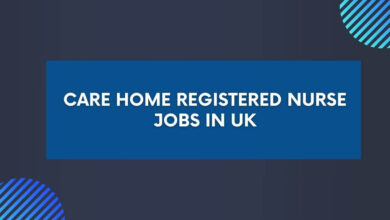Visa Sponsorship Hospitality Jobs in New Zealand 2024

Do you believe you will find a rewarding job in a developed country? Look no further than New Zealand, an ideal destination for people seeking an exciting career. Despite its breathtaking scenery and vibrant culture, New Zealand has an abundance of job opportunities, particularly in the thriving hospitality industry. Join us today as we investigate the domain of Hospitality vocations, revealing the fewest qualifications and clarifying the application interaction for international candidates.
Foreigners Can Work in Hospitality in New Zealand. If you want to work in any developed country in the world, New Zealand is the best place to live and work. As a foreign worker in New Zealand, you can also earn enough to cover your living expenses.
Details of Visa Sponsorship Hospitality Jobs in New Zealand:
- Job Country: New Zealand
- Industry: Hospitality Jobs
- Job Type: Full Time
- Experience Required: No
- Knowledge Required: Not High
- Age Limit: No
- Visa Sponsorship: Yes
- Salary: 15 – 20 NZD Per Hour
Why Choose Hospitality Jobs in New Zealand?
New Zealand entices job seekers from all over the world with its thriving economy and extensive workplace. Hospitality vocations offer an unexpected path for those looking for a high-paying job while living a fulfilling lifestyle. The country’s historic growth in the tourism sector and hospitality creates a plethora of opportunities for people who are passionate about providing exceptional client experiences.
Check Also: List of Companies that Can Sponsor Visas in New Zealand
Requirements for Visa Sponsorship Hospitality Jobs in New Zealand:
- To embark on a profitable career in the New Zealand hospitality industry, it is critical to first understand the fundamental needs. While specific criteria may vary depending on the role and employer, several general guidelines exist.
- Familiarity with English is necessary, as appealing communication plays an important role in providing first-rate service to a different customer. A positive attitude, a strong work ethic, and a client-focused approach are highly valued qualities in the business.
- In terms of abilities, holding relevant credentials or recognitions, such as a Public Endorsement in Cordiality, can significantly increase your employment. Previous experience in the subject, while not always essential, can be a valuable asset when applying for jobs. Furthermore, obtaining necessary work permits and visas is critical for overseas workers searching for jobs in New Zealand.
Types of Hospitality Jobs In New Zealand:
- Hotel Directors: Hotel Directors are in charge of overseeing all aspects of a hotel, such as visitor administration, staff, and planning.
- Café Directors: Café Directors are in charge of the day-to-day operations of a restaurant, such as personnel, customer service, and financial management.
- Restaurant Managers: These individuals are in charge of the day-to-day operations of a restaurant, including staffing, customer service, and financial management.
- Waiter/waitress: Waiters and waitresses take orders and serve food and beverages to customers in restaurants and hotels.
- Housekeeping staff: The housekeeping team is responsible for cleaning and maintaining visiting rooms and public areas.
- Front desk staff: The front desk staff is responsible for greeting visitors, looking them in and out, and replying to any questions they may have.
Benefits of Visa Sponsorship Hospitality Jobs in New Zealand:
- Variable Work Conditions: Hospitality can work in a variety of environments, including restaurants, hotels, event venues, hospitals, colleges, and corporate cafeterias.
- Opportunities at the Entry Level: Numerous positions as Hospitality assistants require minimal prior experience, making them accessible entry points into the hospitality and food service industries.
- Ability Development: Individuals who work in Hospitality gain experience in culinary preparation, customer service, time management, and collaboration.
- Practical Experience: Hospitality is frequently involved in food preparation, presentation, and service, gaining valuable experience in the culinary and hospitality industries.
- Client Interaction: Hospitality interacts with customers, assisting in the development of interpersonal and communication skills while facilitating a pleasant dining experience.
- Exposure to Creative Cooking: In certain positions, hospitality may contribute to menu planning and food presentation, exposing them to culinary innovation and creativity.
- Cooperation: Events and services requiring Hospitality necessitate effective teamwork among employees, nurturing collaboration and camaraderie.
- Rapid-Fire Environment: Hospitality can involve fast-paced work during events and peak periods, allowing individuals to develop their ability to work effectively under duress.
- Adjustable Hours: Numerous Hospitality positions offer flexible hours, allowing individuals to reconcile work with other obligations.
- Industry Relationships: Individuals who work in Hospitality gain access to a network of hospitality and food service professionals.
- Foundation for Professional Advancement: Hospitality assistant positions can be a stepping stone to more senior positions in the culinary arts, hospitality management, event planning, and related disciplines.
- Exposure to Culinary Developments: Hospitality is frequently exposed to current culinary trends and practices, allowing them to remain relevant in an industry that is constantly evolving.
- Customer Gratification: Contributing to successful events and meeting the culinary requirements of customers can result in a sense of accomplishment and job fulfillment.
- Transferable Competencies: Many of the skills obtained as a Hospitality assistant, including organization, time management, and customer service, are transferable to other industries or positions.
- Possibilities for Creativity: Hospitality may have the opportunity to contribute inventive ideas to improve the dining experience, depending on the company or environment.
- Physical and mental quickness: The role frequently necessitates physical activity, multitasking, and situational adaptability, which contribute to overall mental and physical agility.
- Versatile Knowledge: Hospitality acquires experience in a variety of food service facets, such as food preparation and event space setup, which can lead to a well-rounded skill set.
Requirements for Visa Sponsorship Hospitality Jobs in New Zealand:
- A valid work visa: A valid work visa is required to work legally in New Zealand. You can apply for a work visa on the Immigration New Zealand website.
- English language proficiency: You must be able to speak, read, and write in English fluently. Some organizations may need a certain level of English ability, such as an IELTS score, before hiring.
- Relevant experience and qualifications: Depending on the work type, employers may require relevant experience and qualifications. A degree in hospitality management, for example, or several years of industry experience may be required for a hotel manager.
- Excellent health and character: You may be asked to pass a medical examination and present a police clearance certificate to establish that you are in excellent health and have good character.
- Work availability: You must be available to work throughout the hours and days that your employer specifies.
- Other job-specific requirements: Some positions may necessitate a bartending certificate or a food handling certificate.
How to Apply for Visa Sponsorship Hospitality Jobs in New Zealand:
Is it true that you are eager to embark on your dream hospitality job in New Zealand? We’ve included a few basic hints to help you navigate the application.
- Research: Investigate the several hospitality foundations in New Zealand and pick those that match your interests and range of abilities. A thorough assessment will enable you to concentrate on the most feasible opportunities.
- Make an Eye-Catching Resume/CV: Create your resume to highlight relevant experience, skills, and accomplishments. Emphasize your passion for hospitality and any leftover client-care expertise.
- Network: Use professional systems administration stages and industry events to connect with potential bosses or others operating in the New Zealand hospitality business. Systems administration can provide valuable expertise and pathways to previously unknown available professions.
- Normal Compensation: Pay rates in the friendly industry can vary according to a variety of factors, including work position, locality, experience, talents, and type of foundation. In New Zealand, the minimum legal wage is determined by regulation, and as of my most recent knowledge, it was NZD 20.00 per hour.
Frequently Asked Questions:
-
Is New Zealand good for the hospitality industry?
New Zealand saw a boom in the hospitality industry. “New Zealand receives about 4 million overseas tourists each year, providing almost a fifth of its export earnings and one in 12 jobs,” says a New Zealand government report. Interesting food culture.
-
What is the hospitality industry in New Zealand?
It is one of the largest employment sectors in the country, contributing about 1.7% of GDP, equivalent to NZ$5 billion annually. Businesses in this sector can be divided into four broad categories: quick-service restaurants; and takeaways; pubs, hotels, and bars; and cafes and restaurants.
-
Is hospitality in demand in New Zealand?
In 2019, 39.1% of New Zealand’s hospitality sales were in Auckland. The next largest markets were Canterbury (12.3%) and Wellington (10.6%). New Zealand has a shortage of skilled chefs, and the role is listed on Immigration New Zealand’s long-term skills shortage list.




